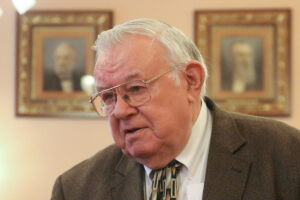Topic: Baker v. Carr

Interview of Ralph Skoog, July 17, 2015
Interviewed by Burdett Loomis
In his 2015 oral history interview, former Representative Ralph Skoog recalls a Kansas Legislature in transition. Ralph was initially elected to represent Topeka and Shawnee County in 1961, prior to the U.S. Supreme Court's Baker v. Carr 'one-person, one-vote' decision. His first 'district' was one-third of Shawnee County. When he returned to the House in 1967 after an unsuccessful campaign for Congress in 1964, he represented a more equal-size district of approximately 17, 000 residents of the County. Ralph recalls a legislature very much in transition at the beginning of the decline of rural domination of Show Morethe policymaking process and at the beginning of institutional change that came to fruition after the end of his last term. He recalls passage of important highway, prison, and school district consolidation legislation during his time of service in the House. Show Less

Interview of Ron Hein, April 16, 2021
Interviewed by Alan Conroy
Ron Hein, former legislator, lobbyist, and lawyer speaks about his 47 years in and around the Kansas Legislature and his impact on Kansas policy. He ran first for the House in 1974 in a 7-way primary which he won. Two years later he ran for the Senate, winning after extensive door-to-door campaigning against a well-known Senator, Bob Storey. He was just 25 when he was sworn into the Senate in 1975, Hein tells some interesting anecdotes about working with Speaker Pete McGill and Senate President Ross Doyen, particularly in his first years in the legislature. Hein Show Moresponsored or cosponsored 142 pieces of legislation on a wide variety of topics. His interview recounts the difficulty he had getting the Higher Education Loan program passed when he was in the House. Ultimately it failed the first year but passed the second. Hein noted the lack of lawyers in today's legislature is detrimental to the process, as is an increased lack of civility. The interview concludes with Hein discussing his lobbying career and why he felt he needed to leave elected office when T. Boone Pickens approached him to represent Mesa Petroleum. Hein notes that he has been more successful getting legislation passed as a lobbyist than as a legislator. Show Less
